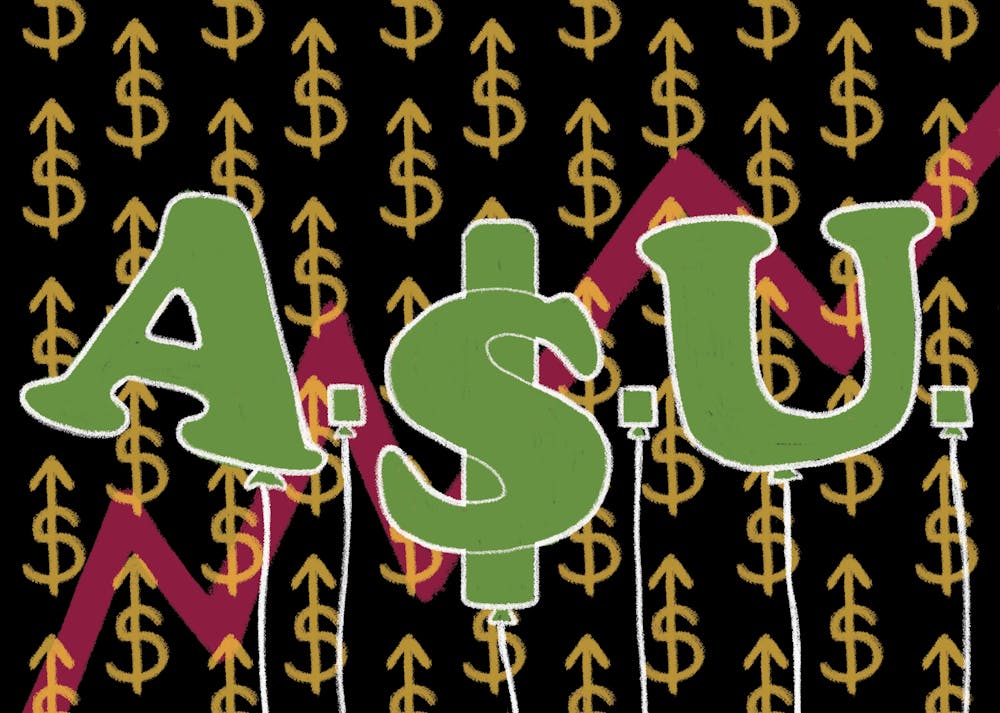Historic inflation has affected markets across the country, and ASU students might see even higher prices on products, and potentially tuition, as a result.
Global supply chain shortages combined with increased demand have driven up prices.
Demand for basic goods and other assets has grown as consumers emerge from a pandemic-induced spending decrease, according to Daniel Marburger, an economics clinical professor at ASU.
"As consumers, we are bogging down and there is a huge pent-up demand," Marburger said. "Because all the people who would have bought a house but didn't, and now they are all buying at the same time. And that's true for an awful lot of stuff."
In December 2020, the nationwide annual inflation rate was 7%, the highest since 1982, according to Trading Economics. In the Phoenix area in December, prices on all consumer goods and services rose 9.7% on average over a 12-month period, according to BLS.
In that period, the price of meats, poultry, fish and eggs rose 14.5%. Energy prices experienced a steep increase of 40% over the same time period, mostly due to the cost of gasoline, according to BLS.
Supply chain issues have also contributed to a lack of supply, driving prices up even further.
ASU sets contracts with its suppliers allowing for small price increases during extreme market conditions. So far, none of the University suppliers have shown serious financial impacts which could raise University expenditures, said Jamon Hill, ASU's assistant vice president of supply chain, in an email.
However, if the University had to spend more on staff wages and supplies because of rising inflation, it could impact tuition costs — but ASU would have to show evidence that its higher expenditures justify a raise in tuition to the Arizona Board of Regents who have the final say — Marburger said.
"Theoretically, when the University wants to have its tuition approved for this coming year, they could present data to the Board of Regents saying 'Look, our costs have gone up. We're gonna have to raise tuition," Marburger said.
Historically, tuition costs rise regardless of inflation.
Between the 2008-09 and 2018-19 academic years, prices for undergraduate tuition, fees, and room and board at public institutions in the U.S. rose around 28%, according to the National Center for Education Statistics, compared to only a 19% increase in nationwide inflation during the same time period.
This year, inflation should not impact ASU's tuition amounts, according to Chris Fiscus, a University spokesperson.
For the 2021-22 school year, the Arizona Board of Regents, which approves tuition rates for Arizona public universities, did not raise tuition costs. Tuition increases at the University have been paused since 2020, in part due to the coronavirus pandemic.
Prices for fast food rose 8% nationwide over a 12-month period, according to the BLS. According to a National Restaurant Association survey in September 2021, 75% of restaurant operators said they were understaffed.
Health concerns might be why some restaurants remain understaffed, especially with the highly transmissible omicron variant, according to Marburger.
While the University is thus far largely unscathed by supply shortages, other parts of Arizona, particularly rural communities, have felt the pain of international supply chain issues.
Bashas' struggled to stock shelves because of supply shortages and a lack of staff at its Chandler distribution center impacting all of the company's stores, according to a statement from Bashas' president sent to the Navajo Nation.
Labor shortages are partly responsible for the higher prices. Production costs for employers rise as they raise wages to attract applicants causing companies to push the costs on the consumer like raising menu prices.
Marburger said although the economic situation is unpredictable now, inflation is likely to calm down eventually.
"I'll take my foot off the gas and then ease on the brakes. And that's kind of what the Fed is saying is like, okay, we're going to have some inflation. We're not going to slam the brakes on because that could trigger a recession. But we're going to take our foot off the gas now and consider putting our foot on the brake," Marburger said.
Reach the reporter at kryback1@asu.edu and follow @KadenRyback on Twitter.
Like The State Press on Facebook and follow @statepress on Twitter.

Kaden is a reporter for the Biztech desk, focusing on student run business, people profiles and research papers. During his time at The State Press, Kaden's biggest piece was about ASU's history with NASA. He's a sophomore majoring in Journalism and Mass Communication.




